Sweeney Todd is a Canadian glam rock band formed in Vancouver in 1975. The band's original lead vocalist Nick Gilder left the band to start a solo career, and was replaced by a 16-year-old Bryan Adams, who later enjoyed international success as a solo artist.
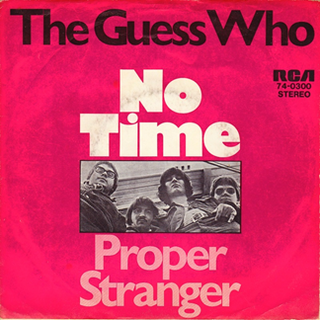
"No Time" is a song by Canadian rock band The Guess Who, composed by guitarist Randy Bachman and lead singer Burton Cummings.

Four Wheel Drive is the fourth studio album by Canadian rock band Bachman–Turner Overdrive, released in 1975. It peaked at No. 1 in Canada on the RPM national albums chart on October 4 and again on October 18, 1975 while hitting No. 5 on the U.S. Pop Albums chart. The most popular single from the album, "Hey You," was written by Randy Bachman. It reached No. 1 in Canada, holding the top position on the RPM national singles chart for two weeks in June, 1975, and No. 21 on the U.S. charts. Some reviews stated the song was directed at Bachman's former Guess Who bandmate, Burton Cummings. "Quick Change Artist" was released as a single in Canada only, and reached No. 13 on the RPM chart.

"Montego Bay" is a song co-written and performed by Bobby Bloom about the city in Jamaica of the same name. The song was a top 10 hit for Bloom in the Fall of 1970 on both sides of the Atlantic. It reached No. 3 on the UK Singles Chart, No. 5 on the Canadian RPM 100 Singles Chart, No. 7 on the Australian Go-Set Singles Chart and No. 8 on the US Billboard Hot 100. The song was co-written and produced by Jeff Barry. In the master tape of the song, Bloom breaks into a chorus of "Oh, What a Beautiful Mornin'" at the end of the recording. The song features a whistler, as well as Jamaican instruments in a calypso style.
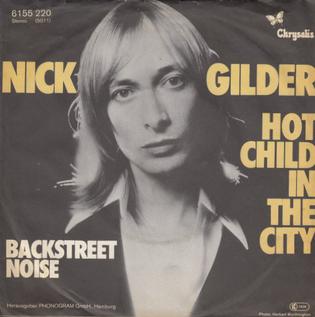
"Hot Child in the City" is a song by English-Canadian musician Nick Gilder. It was released in June 1978 as a single from the album City Nights. It went to No. 1 both in Canada and in the United States. It was not his first No. 1 single: as the lead singer of Sweeney Todd, he had hit No. 1 in Canada on June 26, 1976 with the single "Roxy Roller", which remained at the top for three weeks. He won 2 Juno Awards in Canada and a People's Choice Award in the US. According to The Billboard Book of Number 1 Hits it held the record for taking the longest amount of time to reach No. 1. The song became a platinum record.

"This Masquerade" is a song written by American singer and musician Leon Russell. It was originally recorded in 1972 by Russell for his album Carney and as a B-side for the album's hit single "Tight Rope". The song was then covered on Helen Reddy's 1972 album, I Am Woman. It was then recorded by American vocal duo, the Carpenters, for their 1973 album Now & Then and as the B-side of the Carpenters's single "Please Mr. Postman". Three years later, "This Masquerade" was recorded by American singer and guitarist George Benson, who released it on his 1976 album, Breezin'. Benson's version, featuring Jorge Dalto on piano, was released as a single and became the first big hit of his career.

"Lonely Night " is a song written by Neil Sedaka. The song was first recorded by Sedaka and appeared as a track on his 1975 studio album, The Hungry Years. The following year the song was made popular when covered by the pop music duo Captain & Tennille, who took their version to number 3 on the Billboard Hot 100.

"She Did It" is a song written and originally recorded by Eric Carmen in 1977. Carmen's single was a Top 40 hit on the Billboard Hot 100 chart, reaching number 23. "She Did It" was covered in 1981 by actor and singer Michael Damian, who reached number 69 on the Hot 100 with his version.

"Sweet City Woman" is a 1971 song by Canadian rock band The Stampeders, appearing on their debut album Against the Grain. It features a banjo as a primary instrument, which is also mentioned in the lyrics: "The banjo and me, we got a feel for singing."

"Welcome Back" is a popular record that was the theme song of the 1970s American television sitcom Welcome Back, Kotter. Written and recorded by former Lovin' Spoonful frontman John Sebastian, it reached No. 1 on the Billboard Hot 100 chart for one week in May 1976 after only five weeks on the chart, and also topped the adult contemporary chart. It also reached No. 93 on the country chart.

"Star Baby" is a 1974 hit song by The Guess Who. It was written by Burton Cummings who also provided the lead vocals. It is classified in the genre of Power pop and was included on the group's LP entitled, Road Food as well as The Guess Who – Greatest Hits in 1999 and The Guess Who - Anthology in 2003. The band performed the song on the Midnight Special television program on December 14, 1973.

"Mama Can't Buy You Love" is a hit single for English musician Elton John from the EP The Thom Bell Sessions. The song was written by LeRoy Bell and Casey James. Bowing at number 69 on the Hot 100 on 9 June 1979, the track became John's first US top ten hit in almost three years when it peaked at number 9 on 25 August 1979. "Mama Can't Buy You Love" also spent one week at number 1 on the Adult Contemporary chart. In the US, it was certified gold on 17 August 1979 by the RIAA.
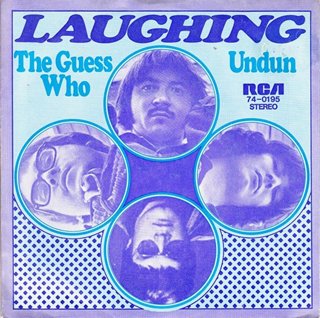
"Laughing" is a popular song by Canadian rock band The Guess Who. It peaked at #1 on the Canadian Singles Chart for a single week and at #10 on the United States' Billboard Hot 100, becoming the band's second single to reach the Top 10 on the latter. It became their second of three gold records in the United States and also made the Top 20 on singles charts in New Zealand and South Africa.

"Hot Line" is a song recorded by American family group the Sylvers, from their 1976 album Something Special. It was written by Freddie Perren and Kenneth St. Lewis. It became an international Top 10 hit, and is a gold record.

"Clap for the Wolfman" is a song written by Burton Cummings, Bill Wallace, and Kurt Winter performed by their band, the Guess Who. The song appeared on their 1974 album, Road Food. The song was ranked #84 on Billboard magazine's Top Hot 100 songs of 1974.
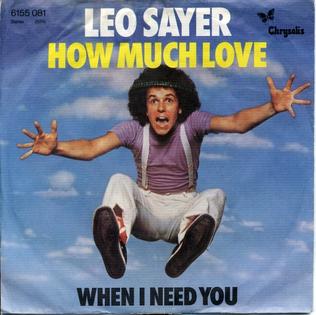
"How Much Love" is a popular song from 1977 by the British singer Leo Sayer. It was the third of three single releases from Sayer's 1976 album, Endless Flight. The song was co-written by Sayer with Barry Mann.

"I Like Dreamin'" is the debut single by Kenny Nolan, taken from his eponymous debut album. The recording was issued as the album's lead single in October 1976, spending 27 weeks on the U.S. Billboard Hot 100.
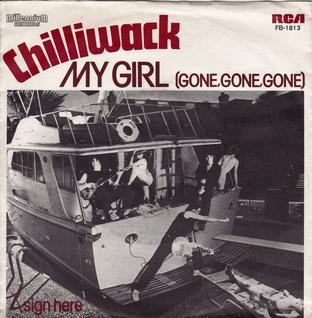
"My Girl " is a song that was performed by the Canadian group Chilliwack. Co-written by bandmembers Brian MacLeod and Bill Henderson, it was released on the band's 1981 album Wanna Be a Star.

"Save It for a Rainy Day" is a song by American singer/songwriter Stephen Bishop. The song was the first of two hit singles from his debut album, Careless. It features a guitar solo by Eric Clapton and Chaka Khan on backing vocals toward the close of the song.
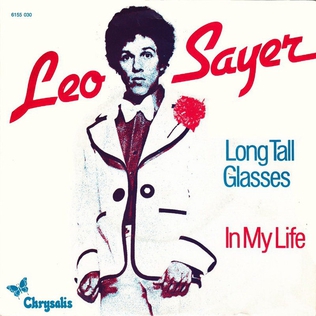
"Long Tall Glasses (I Can Dance)" is a 1974 song by Leo Sayer, co-written with David Courtney. It was released in the United Kingdom in late 1974, becoming Sayer's third hit record on both the British and Irish singles charts and reaching number four in both nations. It was included on Sayer's album Just a Boy.



















